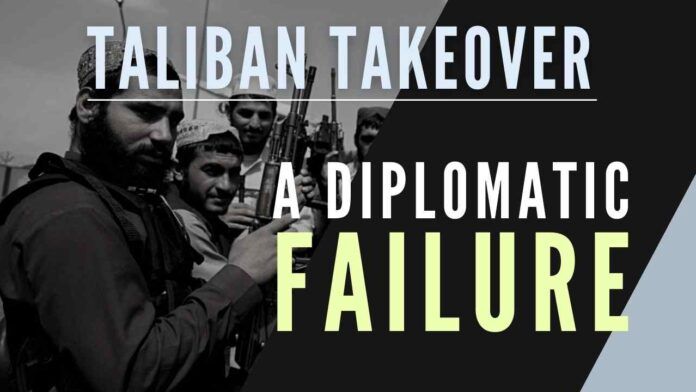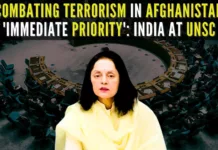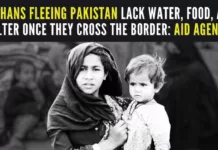
Taliban takeover of Afghan: Strategic setback for entire world strategically, politically, and militarily
The sudden fall of Afghanistan into the hands of the Taliban, that many in the country perceive as a preplanned political conspiracy against the Afghan people, is a strategic setback for the entire world strategically, politically, and militarily.
The re-emergence of the Taliban into power through force and killing, after two decades of sacrifices and a trillion dollars before the eyes of the civilized world, shows that backdoor and irresponsible diplomacy of the Doha peace deal on the fate of a nation has led to total destruction and chaos, rather than finding a dignified and acceptable solution to a conflict or crisis.
This happened after Trump preferred his personal egoism to the realities of war, when he signed a “peace deal” with the Taliban in Doha, in the absence of the Afghan people and the Afghan government which is totally against international and diplomatic norms.
Irresponsible diplomacy and the Doha peace deal vanished the aspiration of an entire nation and changed it into a pariah state under a repressive regime. A regime that prefers to enforce its policies on the people through repression, aggression, and ethnic cleansing, and that does not recognize human rights and diplomatic principles common in today’s interconnected world.
The fall of Afghanistan and failed diplomacy shows future generations that major powers such as the United States, major military alliances like NATO, major unions like the EU and the West in general, set an example of diplomatic betrayal, by abandoning a war-weary nation that has suffered heavy sacrifices fighting in the frontline of international terrorism for world peace and security.
Two decades of joint struggle between the Afghan security forces and their western partners made the world a safer place by preventing other major terror attacks similar to 9/11. But the diplomatic blunder sabotaged the entire gains and joint struggle.
This strategic and diplomatic mistake that was shaped in Afghanistan after the Taliban takeover seems to be giving birth to a new era of conflict and terrorism in the region. The Taliban’s repressive and hardline policies, and their failure to provide basic protection to the people and to address their economic needs, demonstrate their failure to emerge as a moderate political force.
The rise of the Daesh terror group in Afghanistan which has killed two hundred Shia Muslims in two separate suicide bombings within one week is another negative result of the irresponsible diplomacy by the international community in general.[1]
In contrast to western diplomatic propaganda that the Taliban have changed. They have not changed at all. The Taliban and their foreign supporters have dug their grave with their own hands by insisting on the policy of military takeover by disintegrating the Afghan National Security and Defense Forces (ANDSF), who fought day and night to let the world breathe in peace and grow economically and politically.
The two decades of international engagement transformed Afghanistan from an isolated and backward country into a vibrant and developing multi-ethnic democracy in a highly conservative and traditional area. Post-2001 many in and outside the nation were praising the United States and other countries for their support and sacrifices, who enabled the Afghans to exercise their rights as a democratic country at home and in the global arena.
During this period, Afghanistan became a focal point of international diplomacy and security debate. Women who had been deprived of their basic human rights gained an identity under democracy, school doors were opened to millions of girls, press freedom and freedom of speech grew rapidly, investments were made on infrastructures and human institutions, political diversity, and the right of voting were gaining ground and Afghans were moving forward towards nation-building, with a vibrant generation having the desire to live in peace with rest of the world.
For me as a journalist, as a citizen, and as a post-2011 generation, the fall of Afghanistan is the fall of a growing nation that trusted the world and fought a tough war shoulder to shoulder with them, the war of survival for the entire humanity. But the collapse of democracy has now pushed the country on the verge of a human catastrophe, a new era of religious extremism, lawlessness, and radicalism.
Recent events that are shaping up in Afghanistan indicate that the long-suffering nation is facing a new wave of deadly terrorism from the ISIS terror group. Over the past few weeks, the group has staged several attacks on civilian targets including attacks on members of the Taliban.
The Afghan Shia minority and the Hazara ethnic group who are the most peaceful and moderate people are now facing systematic killings and genocide by the ISIS terrorist group. The Taliban who got emboldened after the Doha peace agreement has failed to provide security to the people particularly, the Shia and the Hazaras.
The fall of Afghanistan has also led to a series of socioeconomic tragedies within the nation.
The Afghan health system, economy, and banking system are crippled and are on the verge of a total collapse. If the Taliban do not surrender to a democratic transition, Afghanistan will soon transform into a pariah state.
The Taliban as in the past, have sidelined the Afghan political forces from governance by tightening their grip on the entire power and the country. Such an approach will never lead Afghanistan to political stability and lasting peace. Now the Afghan expect the world not to give a free hand to the Taliban to destroy all gains the country made over the past two decades at the cost of billions of dollars of international aid and massive human casualties. The international community has a moral obligation to press the Taliban to respect human rights, protect the gains and organize free and transparent elections under the watch of the UN and international observers. The era of radicalism and ethnic supremacy is over. 98 percent of Afghans support democracy and peace with the world.
Note:
1. Text in Blue points to additional data on the topic.
2. The views expressed here are those of the author and do not necessarily represent or reflect the views of PGurus.
References:
[1] Daesh claims responsibility for Afghan Shiite mosque attack – Oct 08, 2021, Daily Sabah
PGurus is now on Telegram. Click here to join our channel and stay updated with all the latest news and views
For all the latest updates, download PGurus App.
- Taliban Takeover is a Diplomatic Failure - October 27, 2021











Islamic teaching are self destructive . The day west stops supporting islam with food and medicine they all will die out .